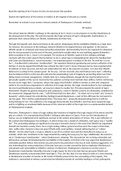Read the opening of Act 5 Scene 2 to line 22 and answer the question.
Explore the significance of this extract in relation to the tragedy of the play as a whole.
Remember to include in your answer relevant analysis of Shakespeare’s dramatic methods.
(25 marks)
The extract features Othello’s soliloquy at the opening of Act 5, Scene 2 as he prepares to murder Desdemona in
the denouement of the play. The extract presents the tragic outcome of Iago’s antagonistic machinations, in
particular their ruinous effects on Othello, Desdemona and their love.
Through his linguistic and structural choices in the extract, Shakespeare firmly establishes Othello as a tragic hero.
For instance, the structure of the soliloquy restores Othello to his original honour and egotism. In the extract,
Othello speaks in composed and measured iambic pentameter, demonstrating how he has regained his eloquence
that he was possessed of at the start of the play, particularly notable when he was testifying against Brabantio’s
bold accusations in Act 1, Scene 3, for example. The structure of Othello’s speech in the soliloquy strikingly
contrasts with the erratic speech that he delivers in Act 4, when Iago is manipulating him about the handkerchief
and Cassio and Desdemona’s ‘sexual encounter’. His disjointed speech is evident in the line “lie with her? Lie on
her?... Handkerchief-confessions- handkerchief!”; the repeated rhetorical questioning and caesura reflective of his
distress. It may be argued that Othello has restored his calm in Act 5, Scene 2 because he has now accepted what
he believes to have occurred, and has now undertaken the role as the executer of justice. It is clear that Othello
believes he is acting for the ‘greater good’, for he says, “yet she must die, else she’ll betray more men”, reflecting
how he believes that he is the one who will stop the perpetuating cycle of tragedy by preventing other men from
falling victim to female transgression. Othello feels he is acting selflessly, though the fact that he believes he is
personally capable of this can be received by the audience as being more hubristic than selfless, further reinforcing
his role as the tragic hero. Conversely, others may argue that Othello’s ability to remain so calm and composed
whilst in his murderous preparations is reflective of his tragic demise; the tragic transformation he has undergone.
He once loved Desdemona so dearly, yet now he is about to murder her. This also presents the extent of Iago’s
Machiavelli. Despite his general eloquence and composure, cracks in Othello’s psyche are detectable, embodied by
the oxymoronic language that he uses: “I will kill thee/And love thee after”, “So sweet ne’er so fatal” and “sorrow’s
heavenly”, which present his contradictory feelings towards Desdemona- a part of him still loves her and wants to
see her good. This is further substantiated when “[he kisses her]”, physically demonstrating that he is still has
loving feelings for her. The antithesis in his language demonstrates how Othello’s mind has been warped by Iago
and he is fighting an emotional battle because of this; internal conflict of the tragic hero is a quintessential element
of Shakespearean tragedy.
Moreover, Shakespeare’s choice of tragic setting also functions to heighten the tragic impact of the extract and the
play as a whole. It is unsurprising that Othello’s soliloquy takes place in Cyprus. From our first introduction of
Cyprus, we are enlightened of its significant contrast to the orderly atmosphere of Venice. This is also reflective of
the context that Shakespeare was writing in, in which Venice was a model of civilisation, and Cyprus was a “warlike
isle”. The contrasting settings are significant to the play’s domestic drama in the sense that Othello has ingratiated
himself into Venetian society; there, he is a high-ranking military general and has earnt the respect of the Duke,
who, unlike other characters does not greet Othello with racial epithets, instead addressing him as “valiant
Othello”. On the other hand, in Cyprus, Othello is out of his comfort zone and this intensifies his status as an
outsider, which also contributes to his tragic downfall by making him easy prey for Iago. Additionally, the extract is
set in “Desdemona’s bedchamber”, where Desdemona is sleeping. This characterises her as being vulnerable and
defenceless, perhaps foreshadowing the inevitability of the tragedy. A feminist critic may argue that Desdemona’s
vulnerable position reflects how women are perceived to be powerless in the face of male violence/aggression. It is
also interesting that some productions of the play have put a curtain around the bed to emphasise Desdemona’s
entrapment and vulnerability to Othello’s violence. Furthermore, Shakespeare’s decision to set the scene in
Desdemona’s bedchamber intensifies the play’s tragic impact for this is the bed that we presume Othello and
Desdemona recently consummated their marriage in. Thus, the fact that it is now about to take on a new meaning
as Desdemona’s location of murder at the hands of Othello presents the true unravelling of the tragedy; “the
audience is constrained to witness a protracted and diabolical parody of courtship leading to a final, grotesquely





